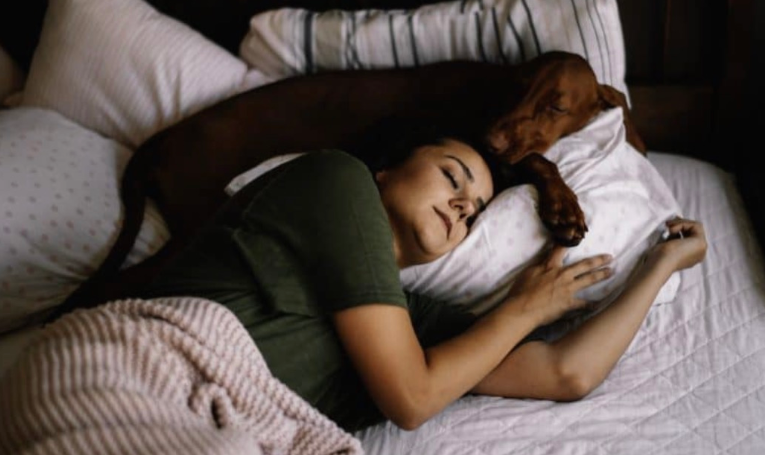
Undoubtedly, the importance of a good night’s sleep for overall health is widely acknowledged. With numerous studies exploring the optimal ways to achieve quality rest, recent research proposes a surprising solution, sharing the bed with dogs. Canisius College in New York State spearheaded this unconventional investigation, revealing that women experience better sleep next to their canine companions compared to human or feline counterparts.
Lead researcher Christy Hoffman, Ph.D., an animal behaviorist, conducted a survey involving nearly a thousand women across the United States to draw these intriguing conclusions. The results unveiled that 55% of participants shared their beds with at least one dog, 31% with a cat, and 57% with a human partner.

Hoffman delved into the reasons behind dogs emerging as superior sleep partners. The study highlighted that dogs’ sleep patterns align more closely with humans than those of cats. Hoffman theorizes that this synchronization may contribute to improved sleep quality, as dogs are adept at accommodating their owners’ sleep schedules, potentially mitigating disruptions caused by differing bedtime routines.
Furthermore, the structured routines imposed by dogs, such as morning walks, assist in regulating their owners’ daily schedules, thereby enhancing overall sleep quality. Another contributing factor is the physical stillness of dogs during sleep, unlike fidgety feline companions. Women in the study reported that dogs tended to remain on the bed throughout the night, fostering a sense of security and stability.
The study’s third crucial finding emphasizes the unique sense of security that dogs provide. Unlike cats or even human partners, dogs offer a heightened level of psychological comfort. Hoffman suggests that the perception of dogs as vigilant protectors, capable of alerting their owners to potential intruders, plays a role in enhancing the sense of security.

Despite these intriguing findings, the study acknowledges the subjectivity of sleep preferences. Factors such as a dog’s snoring or generating excess warmth could pose challenges. Additionally, there are individuals who find solace in the companionship of cats during bedtime.
It’s essential to note that the study relies on participants’ subjective perceptions of their pets’ impact on sleep quality and duration. Consequently, further research is necessary to definitively crown dogs as superior sleeping partners. Hoffman emphasizes the need for continued exploration into the various contexts under which pets positively or negatively influence sleep quality.
As American households increasingly welcome pets, understanding these dynamics becomes crucial. Future research may utilize technologies like Fitbit-like devices to objectively track sleep quality in diverse sleeping conditions, providing a more comprehensive understanding of the intricate relationship between humans and their animal companions during bedtime.
If you see someone wearing these shoes, stop what you’re doing and look around
In the hustle and bustle of our daily lives, it’s easy to become ensnared in our own trials and tribulations, often forgetting that there are individuals facing challenges far greater than our own.
Every person we encounter is engaged in some form of struggle, whether overt or concealed. This underscores the importance of maintaining constant consideration and treating everyone with the utmost respect.
For me, this principle holds particular significance in interactions with individuals navigating life with disabilities. It’s not about bestowing special treatment or fostering pity; rather, it’s about recognizing the profound inspiration they embody and affording them the respect they deserve.
An essential aspect of demonstrating this respect is acquiring knowledge about the obstacles faced by individuals with various disabilities. Consider, for instance, the visually impaired…
The prospect of losing one’s sight is daunting, as our eyes serve as conduits through which we perceive and understand the world. Yet, there are countless individuals coping with severe visual impairment or complete blindness.

For those living with visual impairment, simple tasks become arduous challenges. Enter Tec-Innovation, an Australian company that has developed a groundbreaking solution: InnoMake shoes.
Reports indicate that these innovative shoes utilize advanced sensor technology to assist wearers in navigating obstacles they may not perceive visually. Equipped with built-in sensors, the InnoMake shoes emit vibrations or sounds upon detecting obstacles, akin to the warning systems in automobiles.
‘According to information shared on their YouTube channel, the shoes feature specialized slots for the sensors, which retain their charge for up to a week after a three-hour charging session. Moreover, they can be synchronized with a smartphone, allowing users to customize settings such as alert preferences and minimum detection distances.’According to information shared on their YouTube channel, the shoes feature specialized slots for the sensors, which retain their charge for up to a week after a three-hour charging session. Moreover, they can be synchronized with a smartphone, allowing users to customize settings such as alert preferences and minimum detection distances.



Leave a Reply